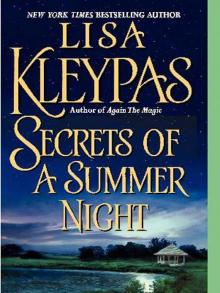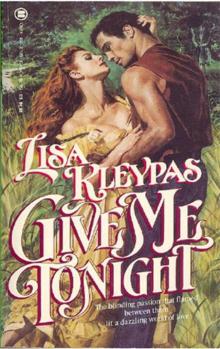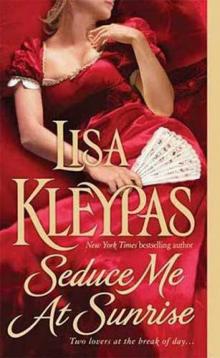- Home
- Lisa Kleypas
Midnight Angel Page 3
Midnight Angel Read online
Page 3
Thoughts of home began to make Tasia's chest ache. It seemed much longer than a week since she had arrived on her cousin Alicia's doorstep. Exhausted, drained of color, Tasia had managed only a wan smile and a brief greeting of “Zdráhstvuyti” before half-fainting in her arms. Although stunned by her unexpected appearance, Alicia had taken Tasia inside immediately. There was no question that she would help her in every way possible. Loyalty ran strong in their family, bred through generations of Slavs whose violent history had made them fiercely tribal. Although Alicia had been brought to England while still a child, she was full-blooded Russian.
“No one knows I'm alive,” Tasia had told her. “But if somehow they discover what has happened, they'll suspect I've taken refuge with relatives somewhere. I can't stay with you. I must disappear.”
Alicia hadn't needed to ask who “they” were. The government authorities wouldn't go that far in the pursuit of justice, being too busy with constant riots and political intrigue. But if Mikhail's family suspected she had escaped, they wouldn't rest until she was found. The Angelovskys were powerful, and Mikhail's older brother Nikolas was known to have a taste for revenge. “We must find you a position as a governess,” Alicia had said. “No one takes notice of a governess, not even the other servants. It's a singularly lonely position, but quite anonymous. As a matter of fact, we have a friend who might agree to hire you. A widower with one daughter.”
Now that she had met Lord Stokehurst, Tasia wasn't certain what she thought of him. Usually it was easy for her to read a person's character, but Stokehurst was difficult. There had been no one like him in St. Petersburg. None of the long-bearded court officials, the self-important military officers, or the languid young aristocrats she had met had been so worldly, so Western. Tasia sensed a tremendous force of will beneath his cool exterior. He was a man who would turn ruthless to get what he wanted. She would rather have nothing to do with such a man, but she didn't have the luxury of choice.
She recalled the way he had tensed when she had seen the silver hook. She had not been repelled by it. Without that flaw he wouldn't have seemed quite human to her. But the air had turned crisp with challenge, and Tasia had known that Stokehurst would rather inspire fear than pity. How much effort it must take for him to camouflage all hint of vulnerability from others. And how much pride he had. It surrounded him like an invisible mantle.
During the ride to his country estate, Stokehurst kept the gleaming hook in full view, resting it casually on his thigh. Tasia suspected the ploy was deliberate, to see if she was unnerved by it. She doubted she was the first to be tested this way. And she was nervous, though it had nothing at all to do with the hook. She had never been alone with a man in her life.
But she was no longer a sheltered heiress destined to marry a prince and preside over palaces filled with servants. Now she was a servant, and the man sitting opposite was her master. She had always ridden in the family carriages, upholstered in mink, with gold trappings and rock-crystal doors, and interiors painted by French artists. This vehicle, luxurious though it was, could not compare. Grimly Tasia reflected that she had never drawn her own bath, or washed her own stockings. Her one useful skill was needlework. From the time she was a child she had possessed a little basket filled with needles, scissors, and colored silk thread, for her mother had believed that a girl should never be allowed to sit idly.
Tasia forced the thoughts from her mind, reminding herself that she must never look back. It did not matter that she had lost her life of privilege. Riches were nothing. All the Kapterev wealth had not been able to keep her father from dying, nor had it brought her comfort in times of loneliness. She wasn't afraid of poverty, or work, or hunger. She would accept whatever the future held. All went according to God's plan.
Wondering just what sort of woman he was taking back with him, Luke watched her with keen blue eyes. Every fold of her dress was perfectly arranged, every muscle still. She sat against the velvet upholstery as if she were posing for a portrait.
“Would you like to know how much I'll be paying you?” he asked abruptly.
She stared at her folded hands. “I trust you will provide an adequate salary, my lord.”
“Five pounds a month should be acceptable.” Luke was annoyed by her slight nod. The amount was well above the usual rate. Some sign of gratitude, or praise for his generosity, wouldn't be unwarranted. But there was nothing.
He didn't think Emma would like her. How could this fey creature find any common ground with his scapegrace daughter? She seemed to be lost in some inner world that held far more appeal than reality. “Miss Billings,” he said tersely, “if you aren't able to fulfill the position to my satisfaction, I'll give you adequate time to find a new situation.”
“That won't be necessary.”
He snorted at her confidence. “You're very young. Someday you'll learn that life holds many surprises.”
An odd smile flitted across her lips. “I have already made that discovery, my lord. ‘Twist of fate’ is how the English put it, yes?”
“I suppose it was a twist of fate that brought you to the Ashbournes?”
“Yes, my lord.”
“How long have you been acquainted with them?”
The hint of a smile vanished. “Is it necessary that you ask questions, sir?”
Luke settled back in his seat and folded his arms comfortably. “I think I'm entitled to a few. Regardless of your dislike of questions, Miss Billings, the fact is that I've agreed to entrust you with my daughter's welfare.”
Her forehead puckered as if she were trying to solve a riddle. “What would you like to know, my lord?”
“Are you a relative of Alicia's?”
“A distant cousin.”
“Are you Russian by birth?”
She didn't move, her lashes lowered. It seemed as if she hadn't heard him. Then she nodded slightly.
“Married?”
Her gaze remained on her folded hands. “Why must you ask that?”
“I want to know if I should expect an enraged husband to appear on my doorstep someday.”
“There is no husband,” she said quietly.
“Why not? Even without money, your face is attraction enough to land a few decent offers.”
“I prefer to remain alone.”
He smiled wryly. “I prefer that myself. But you're far too young to resign yourself to a lifetime of solitude.”
“I am twenty-two, sir.”
“Like hell,” he said softly. “You're barely older than Emma.”
She glanced up at him then, her face lovely and severe. “Years don't really matter, do they? Some people never know more at sixty than they did at sixteen. Some children are aged by experience, and they know far more than the adults around them. Maturity isn't easy to measure.”
Luke looked away, the glint of challenge fading. What had happened to her, and why was she alone? There must be someone—a father, a brother, a guardian—who had taken care of her. Why was there no one to protect her now?
He rubbed his fingertips over his left sleeve, feeling for the outline of the leather strap that bound the hook to his arm. Miss Karen Billings—whoever she was—made him restless. Silently he damned Charles. A month. A whole bloody month.
She was absorbed by the scenery outside the window as they neared the outskirts of Southgate. Originally an estate village, it had broadened into a bustling town with the largest marketplace in the county. It was bordered with lush meadows and creeks, and a forest of beech and oak. The handsome brick buildings that housed the corn exchange, the mill, and the grammar school had been designed by Luke's grandfather. He had also lent his talents to the church in the town center, an austere structure faceted with large stained-glass windows.
The outline of an impressive manor house rose on a broad hill that overlooked the land for miles around. Miss Billings glanced at Luke questioningly.
“That's Southgate Hall,” he said. “Emma and I are the only Stokehursts in res
idence. My parents prefer to stay on our property in Shropshire. My sister married a Scotsman, and they live in Selkirk.”
The carriage traveled up a winding road, through the gate of a massive wall that had originally protected a Norman fortress. Southgate Hall had been built on the remains of the original castle. The central section dated from the sixteenth century, while the rest had been added in modern times. With its romantic profusion of turrets and gables, and its soaring height, it was known as one of the most picturesque homes in England. Art students often visited to paint their own renditions of the distinctive house and the interplay of brick and glass across its east-facing front.
They stopped at the entrance, surmounted by trefoil moldings and a medallion bearing the family crest. After being helped from the carriage by footmen dressed in black livery, Tasia stared at the carved image over the door. It was a hawk, clutching a single rose in its talons.
She started as she felt a touch at her elbow, and turned toward Lord Stokehurst. The sun was at his back, casting his lean face in shadow. “Come inside,” he said, gesturing for her to precede him. An elderly butler with a long chin and balding head held the door open. Lord Stokehurst introduced them. “Seymour, this is Miss Billings, the new governess.”
Tasia was surprised at being presented to the butler, instead of the other way around. Then she remembered that she was no longer a lady, but a servant of lower rank. Inferior was always presented to superior. A rueful smile crossed her lips, and she dropped a quick curtsy to Seymour. They entered a magnificent hall two stories high, with an octagonal stone table in the center. A flood of natural light shone through the solar windows up above. Tasia's appreciation of the hall was interrupted by a shout that echoed off the walls.
“PaPa!” A tall girl with gangly limbs and a mass of wild red hair flew into the room.
Luke frowned as he saw his daughter rounding the corner in pursuit of a large dog. Not quite fullgrown, the dog was a mixed breed with a liberal dose of wolfhound. A few months ago Emma had bought him from a peddler in the village. No one at Southgate Hall, even those with a professed love of animals, shared her appreciation for the mutt. His coat was shaggy and coarse, a mixture of brown and gray. He had small eyes, a huge muzzle, and ridiculously long, flapping ears that had inspired Emma to name him Samson. His huge appetite was equaled only by his resistance to any kind of training.
Catching sight of Luke, Samson rushed forward with happy, deep-throated barks. But as he noticed the presence of a stranger, he bared his teeth and began to snarl. Drops of saliva splattered the floor. Emma clutched his collar and commanded him to be quiet, while he lunged to break free. “Stop it, Samson, you blasted beast! Behave yourself—”
Luke's deep voice undercut the din. “Emma, I told you not to bring him in the house.” As he spoke, he automatically pulled Miss Billings's frail form behind him. The dog seemed intent on tearing her to bits.
“He won't hurt anyone,” Emma shouted, struggling to keep hold of the dog. “He just makes a lot of noise!”
Luke was about to drag the dog away when he realized Miss Billings had slipped around him. Staring at the snarling animal with narrowed eyes, she began to speak in Russian. Her voice was soft and guttural, crackling like flame. Luke didn't understand a word of it, but the hair on the back of his neck stood straight. Her voice had a similar effect on Samson, who quieted and stared at the newcomer with wide eyes.
Suddenly the dog dropped to his stomach and crawled toward her. A whimpering appeal came from his throat, while his tail swept across the floor with violent wags. Miss Billings bent and patted his rough head gently. Rolling onto his back, Samson wriggled in ecstasy. Even after Miss Billings stood up, the slobbering giant remained at her feet.
Responding to a curt order from Luke, a footman rushed to take the dog outside. Samson lumbered away with great reluctance, his head held so low that his tongue and ears nearly dragged the ground.
Emma was the first to speak. “What did you say to him?”
Miss Billings's blue-gray eyes swept over the girl, and she smiled faintly. “I reminded him of his manners.”
Warily Emma addressed the next question to her father. “Who is she?”
“Your governess.”
Emma's jaw dropped. “My what? But Papa, you didn't tell me—”
“I didn't know myself,” he said dryly.
Tasia's gaze swept over Stokehurst's daughter. Emma was a skinny, awkward girl just crossing the threshold of adolescence. Her curly hair was a carroty-red that would draw attention wherever she went. Tasia guessed that Emma was the victim of merciless teasing from other children. The hair would have been temptation enough, but she was also very tall—it was possible she would eventually reach six feet. Her shoulders slumped forward in an effort to conceal her height. The skirts of her frock were too short, and her nails were dirty. She had her father's beautiful sapphire eyes, but her lashes were auburn instead of black, and her face was spattered with golden freckles.
A tall, gray-haired woman approached them, her angular face wearing a no-nonsense expression. There was a huge ring of keys at her belt, the symbol of authority worn by every housekeeper.
“Mrs. Knaggs,” Stokehurst said, “this is the new governess, Miss Billings.”
The housekeeper's brows pinched together in a frown. “Indeed. A room must be prepared. I suppose the same as before?” Her tone implied that this latest governess would probably last no longer than the previous one.
“Whatever you think best, Mrs. Knaggs.” Stokehurst strode to his daughter and kissed the top of her head. “I have work to do,” he murmured. “We'll talk at supper.”
Emma nodded, her gaze fastened on Tasia while Stokehurst left them without another word.
“Miss Billings,” the housekeeper said briskly, “I shall direct someone to prepare a room for you. In the meantime you might like to sit with a cup of tea.”
A cup of tea had never sounded so inviting. It had been a long day, and Tasia hadn't yet recovered her strength since leaving Russia. She was exhausted. But she shook her head. At the moment it was more important to give her attention to Emma. “Actually I would rather tour the house. Would you take me around, Emma?”
“Yes, Miss Billings,” the girl said dutifully. “What would you like to see? There are forty bedrooms, and nearly as many sitting rooms. There are galleries, courtyards, the chapel…It would take a full day to show you everything.”
“For now, just show me what you think is important.”
“Yes, Miss Billings.”
As they wandered through the ground floor of the mansion, Tasia admired the beauty of the place. It was very different from the Ashbournes” fashionably cluttered Victiorian home with its heavy furniture. Southgate Hall was filled with clean white plasterwork and pale marble. Large glass windows and high ceilings made the rooms airy and bright. Most of the furniture was French, similar to what Tasia had been accustomed to in St. Petersburg.
At first Emma said very little, stealing frequent glances at Tasia. However, after they toured the music room and strolled through a long gallery filled with artwork, Emma's curiosity asserted itself. “How did Papa find you?” she asked. “He said nothing about bringing a governess for me today.”
Tasia paused to examine a pastoral scene by Boucher. It was one of many modern French works in the gallery, all of them chosen with a good eye for light and color. She dragged her attention from the painting as she replied. “I was staying with your friends, the Ashbournes. They kindly recommended me to your father.”
“I didn't like the last governess. She was very strict. She never wanted to talk about interesting things. Only books, books, books.”
“But books are very interesting.”
“I don't think so.” They continued to walk along the gallery at a slow pace. Emma stared at her openly now, her blue eyes quizzical. “None of my friends has a governess like you.”
“Oh?”
“You're young, and you have
a strange way of talking. And you're very pretty.”
“So are you,” Tasia said softly.
Emma made a comical face. “Me? I'm a big, carrot-topped girl.”
Tasia smiled. “I always wished to be tall, so that when I walked into a room, everyone would think I was a queen. Only women with your height can be truly elegant.”
The girl blushed. “I've never heard that before.”
“And your hair is lovely,” Tasia continued. “Did you know that Cleopatra and the ladies of her court used to dye their hair with henna to make it red? It's quite a fortunate thing to have it naturally.”
Emma made a skeptical sound as they turned a corner. The next hallway was lined with glass windows that provided views of the gold and white ballroom. “Are you going to teach me how to behave like a lady?” she asked suddenly.
Tasia smiled, thinking that Emma had inherited her father's habit of springing blunt questions right in one's face. “It was mentioned to me that you required some advice on the subject,” she admitted.
“I don't see why anyone should have to be a lady. All those blasted rules and manners…I shan't be any good at it.” She screwed up her face comically.
Sternly Tasia willed herself not to laugh. It was the first time in months that something had tickled her sense of humor. “It's not difficult. It's almost like a game. I think you'll do very well at it.”
“I can't do anything well if I don't see a reason for it. Why does it matter if I eat with the wrong fork, as long as I am fed?”
“Do you want the philosophical reason, or the practical one?”
“Both.”
“Most people believe that without proper etiquette, all civilization would crumble. First go the manners, then morality, and then we should come to an end just as the decadent Romans did. More importantly, if you make an obvious faux pas after you've come out in society, it will embarrass you and your father, and make it very difficult for you to attract the attentions of honorable young men.”
“Oh.” Emma stared at her with increasing interest. “Were the Romans really decadent? I thought all they did was have wars and build roads and make long speeches about government.”

 Devil in Spring
Devil in Spring Sugar Daddy
Sugar Daddy Devil in Winter
Devil in Winter Dreaming of You
Dreaming of You Christmas Eve at Friday Harbor
Christmas Eve at Friday Harbor Love, Come to Me
Love, Come to Me Only With Your Love
Only With Your Love Suddenly You
Suddenly You Secrets of a Summer Night
Secrets of a Summer Night Cold-Hearted Rake
Cold-Hearted Rake Where's My Hero?
Where's My Hero? Gifts of Love
Gifts of Love Married by Morning
Married by Morning Then Came You
Then Came You Wish List
Wish List Where Dreams Begin
Where Dreams Begin A Historical Christmas Present
A Historical Christmas Present Somewhere I'll Find You
Somewhere I'll Find You Scandal in Spring
Scandal in Spring Someone to Watch Over Me
Someone to Watch Over Me Worth Any Price
Worth Any Price Prince of Dreams
Prince of Dreams It Happened One Autumn
It Happened One Autumn Love in the Afternoon
Love in the Afternoon Devil's Daughter
Devil's Daughter A Wallflower Christmas
A Wallflower Christmas Tempt Me at Twilight
Tempt Me at Twilight Brown-Eyed Girl
Brown-Eyed Girl Mine Till Midnight
Mine Till Midnight Again the Magic
Again the Magic Lady Sophia's Lover
Lady Sophia's Lover Because You're Mine
Because You're Mine Midnight Angel
Midnight Angel Smooth-Talking Stranger
Smooth-Talking Stranger Blue-Eyed Devil
Blue-Eyed Devil Hello Stranger
Hello Stranger Dream Lake
Dream Lake Devil's Daughter: The Ravenels Meet the Wallflowers
Devil's Daughter: The Ravenels Meet the Wallflowers A Christmas to Remember
A Christmas to Remember Smooth Talking Stranger
Smooth Talking Stranger Crystal Cove
Crystal Cove Marrying Winterborne
Marrying Winterborne Stranger in My Arms
Stranger in My Arms Devil in Disguise
Devil in Disguise Worth Any Price bsr-3
Worth Any Price bsr-3 Give Me Tonight
Give Me Tonight Rainshadow Road fh-2
Rainshadow Road fh-2 Seduce Me At Sunrise
Seduce Me At Sunrise I Will
I Will Someone to Watch Over Me bsr-1
Someone to Watch Over Me bsr-1 Lady Sophias Lover bsr-2
Lady Sophias Lover bsr-2 A Hathaway Wedding
A Hathaway Wedding A Hathaway Wedding (Hathaways Bk2.5)
A Hathaway Wedding (Hathaways Bk2.5) Worth Any Price - Bow Street 3
Worth Any Price - Bow Street 3 Christmas with Holly
Christmas with Holly